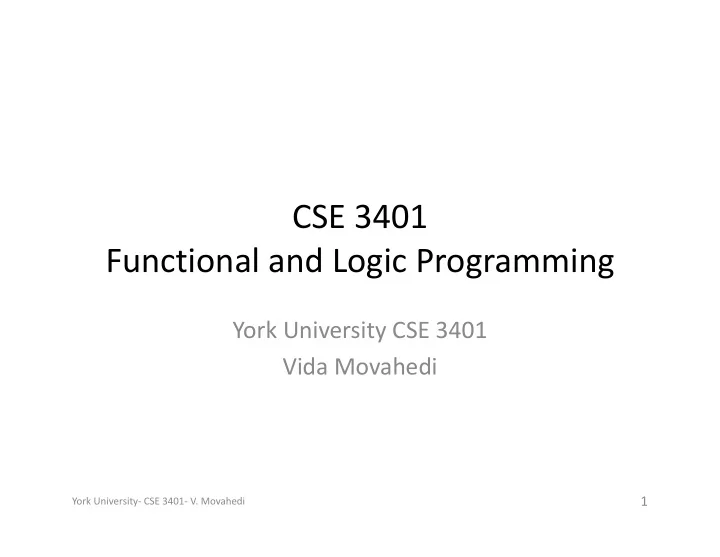

CSE 3401 Functional and Logic Programming York University CSE 3401 Vida Movahedi 1 York University ‐ CSE 3401 ‐ V. Movahedi
CSE 3401 CSE 3401 • SC/CSE 3401 3.00 ‐ Functional and Logic Programming SC/CSE 3401 3.00 Functional and Logic Programming • Vida Movahedi , vida@cse.yorku.ca • Lecture Hours: Wednesdays 19:00 ‐ 22:00, PSE 321 • Office hours: Office hours: – Mon. 12:00 ‐ 14:00 CSEB 2002 York University ‐ CSE 3401 ‐ V. Movahedi 2
General Description [from 2009/2010 Undergraduate Calendar ] CSE 3401 3.0 Functional and Logic Programming • This course covers functional and logic programming. Together with the students' background on • procedural and object ‐ oriented programming, the course allows them to compare the development of programs in these different types of languages. "Functional programs work with values not states Their tools are expressions not commands Functional programs work with values, not states. Their tools are expressions, not commands. • How can assignments, arrays and loops be dispensed with? Does not the outside world have states? These questions pose real challenges. The functional programmer can exploit a wide range of techniques to solve problems." (Paulson, 1996) "Based on predicate logic, it [logic programming] allows computing problems to be expressed in a Based on predicate logic, it [logic programming] allows computing problems to be expressed in a • completely `declarative' way, without giving instructions for how the problem is to be solved. An execution mechanism, like the one embodied in implementations of Prolog, can then be used to search efficiently and systematically for a solution of the problem." (Spivey, 1996) Topics on functional programming may include: recursive, polymorphic and higher ‐ order functions; p p g g y , p y p g ; • recursive types and type inference. Topics on logic programming may include backtracking, resolution and unification. Prerequisites: General prerequisites, MATH1090 3.0 • York University ‐ CSE 3401 ‐ V. Movahedi 3
Text books & resources Text books & resources • Textbooks: Textbooks: – Common LISPcraft, Robert Wilensky, W.W. Norton & Co. , 1986 – Programming in Prolog, W.F. Clocksin, C.S. Melish, P i i P l W F Cl k i C S M li h Springer ‐ Verlag, 5’ed, 2004 • Online books: O li b k – Ulf Nilsson and Jan Maluszynski, Logic, Programming and Prolog (2ed) (free download available); g – Peter Seibel, Practical Common Lisp , Apress • Website: www.cse.yorku.ca/course/3401 y / / York University ‐ CSE 3401 ‐ V. Movahedi 4
Workload & grading Workload & grading • Assignments & Lab (4 assignments, 1 lab, 30% total) Assignments & Lab (4 assignments, 1 lab, 30% total) • Midterm exam (30%) • Final exam (40%) York University ‐ CSE 3401 ‐ V. Movahedi 5
Others Others • Important Dates po a a es – Lab: June 16, 2010 – Midterm: June 23, 2010 – Drop date: July 5 2010 Drop date: July 5, 2010 – Last day of course: July 28, 2010 – Summer Exam Period: Aug. 3 ‐ 13, 2010 • Policies – Academic honesty – Missed exams Missed exams – Late assignments = not ‐ submitted assignment! – To get a passing final grade, you need to pass both parts of this course: Logic Programming AND Functional Programming course: Logic Programming AND Functional Programming. York University ‐ CSE 3401 ‐ V. Movahedi 6
Recommend
More recommend